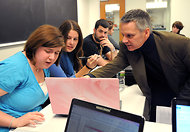Literary Programming

NY Times April 01, 2012
The use of computers to manage the storage and retrieval of written texts creates new opportunities for scholars of ancient and other written works. Recent advances in computer software, hypertext and database methodologies have made it possible to ask novel questions about a story, a trilogy, an anthology or corpus. This course teaches computer programming as a vehicle to explore the formal symbol systems currently used to define our digital libraries of text. Programming facilitates top-down thinking and practice with real-world problem-solving skills such as problem decomposition and writing algorithms.
Syllabus
Download Syllabus – Spring 2018
Sample Assignments
I’ve shared my latest collection of assignments at NCWIT EngageSEdu.
Search for our programming assignment “starter kits”, search for [ LeBlanc Poets].
LeBlanc, M.D. (2016). Computing and the Digital Humanities. NCWIT EngageCSEdu Teaching Paper.
Programming facilitates top-down thinking and practice with computational thinking skills such as problem decomposition, algorithmic thinking, and experimental design. Learning to write programs opens new methods of “close reading”.